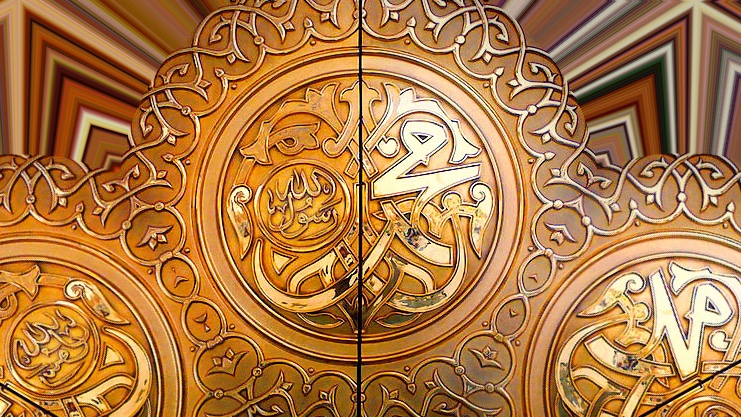Bismillah al-Rahman al-Rahim
Our Prophet
Our Companion
Added September 30, 2021

The Qur’an’s verses contain open, apparent meanings and simultaneous inner, deeper meanings. Literal meanings are only the skin of the book, beyond that lie the allusions, the subtleties, and the deepest realities. The inner allusions, subtleties, and realities layer one upon the other, all simultaneously combined and concealed in the external arrangement of words upon a page. When read or heard, the words enter the mind and begin to come to life, displaying refractions of nuance and purport, and begin to show, to the perceptive mind, the concealed colors that lie unified and blended within the phrasings just as all the nuanced wavelengths of light are combined and concealed within the light from the sun. Our contemplation of the verses, like a prism splits and unfolds the subtle diversity hidden within the unity of the phrasing. The meanings enter the heart, multiply, and, like life-giving breath, expand it: “O my Lord! Expand my breast for me” (Qur’an 20:25) The substance underlying the meanings begins to manifest within the internal universe of our selves, they generate a congruence with the overarching realities that stand above and enwrap this universe in which we dwell, and understanding begins to appear. “O my Lord, You have shown me the significance and meaning of all that I have encountered.” (from a dua of Imam Husayn)
And then we perhaps obtain a glimmer, a minuscule hint, a faint suggestion of the mighty reality of the Qur’an’s substance, its elevated nature, which in turn seeks to elevate our lower nature. And if we need to see an example of this nature brought to life before us, we have our Prophet, we have the Prophet’s nature - for he was the living Qur’an - the one upon whose heart the Qur’an in its entirety descended and within whom the full substance of its meanings and the great realities with which they were connected unfolded. And so about the Prophet, it says, “And surely you are of a tremendous (exalted) nature” (Qur’an 68:4)
We can seek to know our Prophet through history, through the hadith, through his circumstances, through what his family and companions have conveyed about him, through what historians have written about him. But in the end, most profoundly we come down to this: “His character is the Qur’an.” That revelation that descended upon his heart and expanded it beyond all bounds so that his nature encompassed earth and heaven, knowledge of this world and the highest transcendence.
To the extent that we are connected to the revelation, to the extent that it unfurls and comes alive within us, to the extent that it moves within our hearts and illuminates our awareness, to that extent we can say we know our Prophet. To that extent our nafs will have some slight tenuous connection with the profundity of his nafs and with his spirit - but since the Qur’an actualizes only weakly within even the best of us, then “surely the Prophet has a greater right over the believers than they have over their own nafs (selves)…whoever obeys the messenger verily he has obeyed God” (Qur’an 33:6/4:80). And so one who even weakly brings the Prophetic character, through the Qur’an, to life within himself will have made a beginning on the path of straightening his own nafs - this through acceding to and acknowledging the Prophet’s guiding claim over the nafs of the believer.
So let him be your companion, this living Qur’an. Let him stand beside you as an example and as a guide when you speak, when you act, let his character manifest for you in some small way within your own heart through the verses of the Qur’an. Then who could approach injustice, which believer could unjustly trespass on the life and property of another, or gather wealth only for themselves in the presence of poverty, or turn away from those without hope, or slight a woman, when that Prophet who would rise to his feet at the approach of his daughter, who was the hope and shelter of the orphans and of the oppressed, and the support of those whose hands were empty, stands guardian over the believer’s nafs.[1]
“The spiritual vision of the Prophet never wavered in the least, nor did it swerve, and he certainly witnessed the greatest Signs of His Lord” (Qur’an 53:17-18)
*
To be notified when new articles are added to this site, please follow @i_from_i (islam from inside). Or, if you prefer, subscribe to the islam from inside RSS feed.
Footnotes
-
1 – Related Articles
